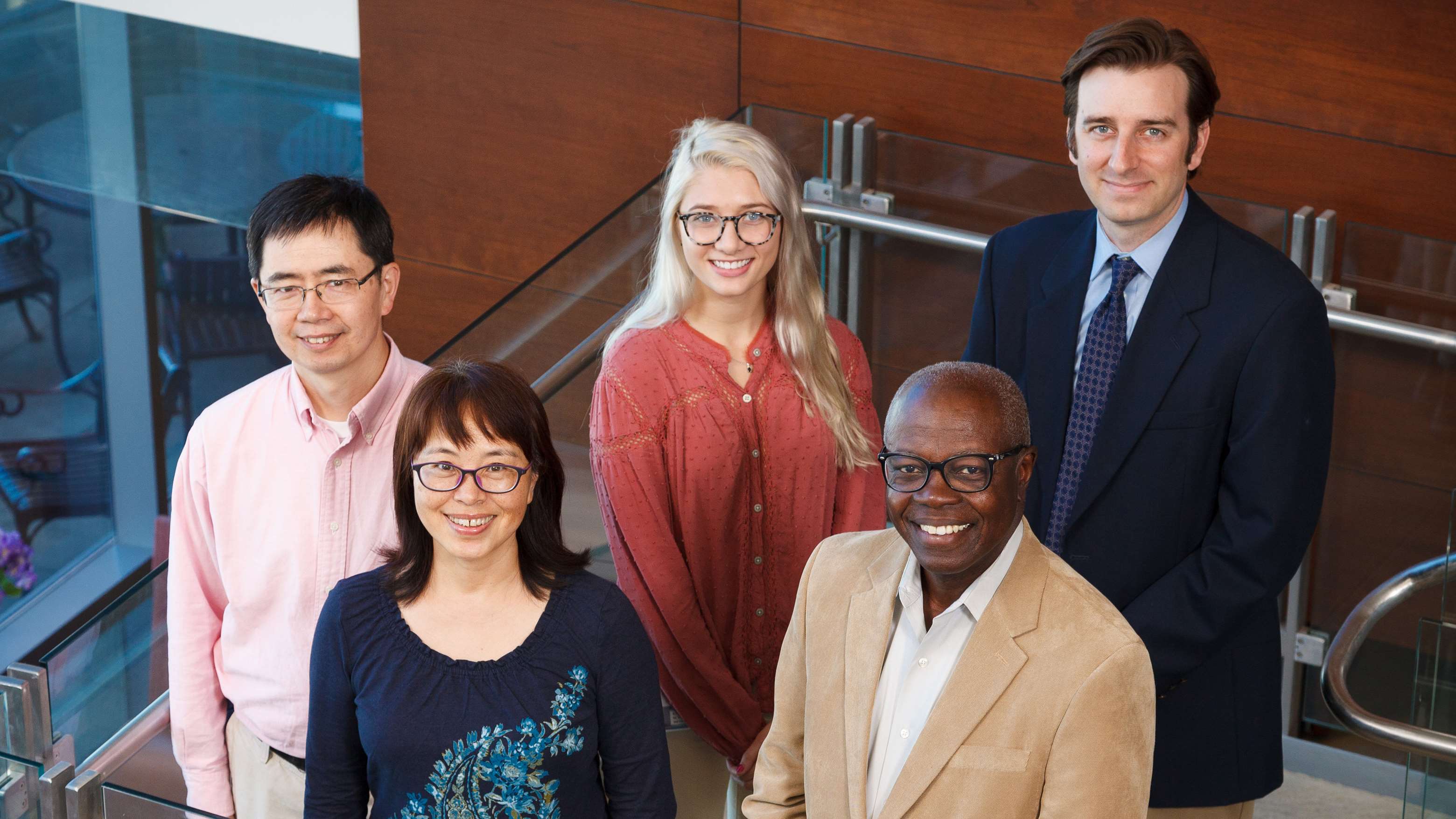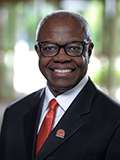Ivor Benjamin Lab
Dr. Benjamin has been a champion by providing leadership to broaden the global reach of biomedical research in efforts to reduce death and disability from cardiovascular diseases, stroke and other brain disorders.
He is a primary investigator for other major cardiovascular research projects including a $4 million award funded by the Advancing a Healthier Wisconsin Endowment. Recently, he completed his term as president of the Association of University Cardiologists and is now serving a year-long tenure as the American Heart Association’s 82nd president.

Cardiovascular Research Center In The News
Dr. Ivor Benjamin onstage at Apple product launch
Watch Dr. Benjamin introduce new functionality that provides the ability for people to access health data from an on-demand Electrocardiogram (ECG).
The State of Heart Research
Milwaukee's NPR radio program Lake Effect speaks with Ivor Benjamin, MD, Director of the MCW Cardiovascular Research Center about the state of cardiovascular research and the national push to train the general population in CPR and the use of automated external defibrillators (AEDs).

Ivor Benjamin, MD, FAHA, FACC
former Director
Professor, Medicine, Physiology, Pharmacology and Toxicology, Cell Biology, Neurobiology and Anatomy, and Surgery
Froedtert & the Medical College of Wisconsin
ibenjamin@mcw.edu
Dr. Ivor Benjamin is the former Director of the Cardiovascular Research Center, co-director of the NIH T32 Postdoctoral Fellowship in Cardiovascular Sciences and co-leader of the CVRC’s Signature Program in Precision Cardiovascular Medicine. He is a professor of medicine, physiology, pharmacology and toxicology, cell biology, neurobiology and anatomy, and surgery at the Medical College of Wisconsin. Dr. Benjamin earned his MD from the Johns Hopkins University School of Medicine, internship and residency in Internal Medicine at Yale University School of Medicine, and received fellowship training in clinical cardiology, molecular cardiology, and molecular biology at Michael Reese Hospital (University of Chicago), Duke University Medical Center, and The University of Texas Southwestern Medical Center at Dallas. A certified specialist and consultant in internal medicine and cardiology, his clinical interests are general cardiology, inheritable heart failure, and myocardial infarction. His research focuses on genes encoding heat shock proteins and oxido-reductive stress response pathways of direct relevance to genetic forms of heart disease, cardiotoxicological science and precision medicine.
An Established Investigator of the American Heart Association, Dr. Benjamin’s longstanding and distinguished career as a physician scientist has taken him across the country, including 10 years at the University of Utah School of Medicine where he was named the Division Chief of Cardiology and the Christi T. Smith Endowed Chair of Cardiovascular Medicine. He is the recipient of countless honors including the Award of Merit from the American Heart Association, the Daniel Savage Memorial Service Award from the Association of Black Cardiologists, and the prestigious NIH Director's Pioneer Award from the National Heart, Lung, and Blood Institute. He serves as Editor-in-Chief of Cecil Essential of Medicine 9th Edition and has authored over 130 books, book chapters and scientific papers. Dr. Benjamin is a founding member of the Journal of the American Heart Association, and he currently serves on the editorial boards of Circulation and Circulation Research.
Recent Publications
-
Machine Learning and Artificial Intelligence for Research on Hypertension.
(Khamissi FZ, Sun L, Johnson P, Shah S, Benjamin IJ.) Am J Hypertens. 2025 Oct 14;38(11):867-871 PMID: 40251785 SCOPUS ID: 2-s2.0-105018701781 04/19/2025
-
Antioxidants in Cardiovascular Health: Implications for Disease Modeling Using Cardiac Organoids.
(Ross GR, Benjamin IJ.) Antioxidants (Basel). 2025 Oct 03;14(10) PMID: 41154511 PMCID: PMC12561675 10/29/2025
-
(Wu JC, Arnett DK, Benjamin IJ, Creager MA, Harrington RA, Hill JA, Michael Ho P, Houser SR, Scarmo S, Shah SH, Tomaselli GF, American Heart Association.) Circulation. 2025 Apr 08;151(14):e919 PMID: 40193541 SCOPUS ID: 2-s2.0-105003323318 04/07/2025
-
(Wu JC, Arnett DK, Benjamin IJ, Creager MA, Harrington RA, Hill JA, Ho PM, Houser SR, Scarmo S, Shah SH, Tomaselli GF, American Heart Association.) Circulation. 2025 Apr 08;151(14):e867-e876 PMID: 39968665 SCOPUS ID: 2-s2.0-85219515262 02/19/2025
-
(Karthikeyan SK, Nallasamy P, Cleveland JM, Arulmani A, Raveendran A, Karimi M, Ansari MO, Challa AK, Ponnusamy MP, Benjamin IJ, Varambally S, Rajasekaran NS.) Redox Biol. 2025 Apr;81:103525 PMID: 39986116 PMCID: PMC11893311 SCOPUS ID: 2-s2.0-85218106319 02/23/2025
-
(Ross GR, Vodanovic-Jankovic S, Benjamin IJ.) J Cell Mol Med. 2024 Dec;28(24):e70273 PMID: 39716037 PMCID: PMC11666423 SCOPUS ID: 2-s2.0-85212828748 12/24/2024
-
(Elkind MSV, Arnett DK, Benjamin IJ, Eckel RH, Grant AO, Houser SR, Jacobs AK, Jones DW, Robertson RM, Sacco RL, Smith SC Jr, Weisfeldt ML, Wu JC, Jessup M.) Circulation. 2024 Mar 19;149(12):e964-e985 PMID: 38344851 SCOPUS ID: 2-s2.0-85188281363 02/12/2024
-
(Ibrahim EH, Rubenstein J, Sosa A, Stojanovska J, Pan A, North P, Rui H, Benjamin I.) Tomography. 2024 Feb 27;10(3):331-348 PMID: 38535768 PMCID: PMC10974260 SCOPUS ID: 2-s2.0-85188901578 03/27/2024
-
(Jacobs ER, Ross GR, Padilla N, Pan AY, Liegl M, Puzyrenko A, Lai S, Dai Q, Uche N, Rubenstein JC, North PE, Ibrahim EH, Sun Y, Felix JC, Rui H, Benjamin IJ.) J Mol Cell Cardiol. 2023 Dec;185:1-12 PMID: 37839656 PMCID: PMC11000691 SCOPUS ID: 2-s2.0-85174455933 10/16/2023
-
(Wallace M, Zahr H, Perati S, Morsink CD, Johnson LE, Gacita AM, Lai S, Wallrath LL, Benjamin IJ, McNally EM, Kirby TJ, Lammerding J.) Mol Biol Cell. 2023 Aug 16;34(12):mbcE21100527 PMID: 37585285 PMCID: PMC10846625 SCOPUS ID: 2-s2.0-85183571175 08/16/2023
-
(Uche N, Dai Q, Lai S, Kolander K, Thao M, Schibly E, Sendaydiego X, Zielonka J, Benjamin IJ.) Antioxidants (Basel). 2023 Aug 09;12(8) PMID: 37627583 PMCID: PMC10451268 08/26/2023
-
(Puzyrenko A, Jacobs ER, Padilla N, Devine A, Aljadah M, Gantner BN, Pan AY, Lai S, Dai Q, Rubenstein JC, North PE, Simpson PM, Willoughby RE, O'Meara CC, Flinn MA, Lough JW, Ibrahim EH, Zheng Z, Sun Y, Felix J, Hunt BC, Ross G, Rui H, Benjamin IJ.) J Am Heart Assoc. 2023 Feb 21;12(4):e027990 PMID: 36789856 PMCID: PMC10111490 SCOPUS ID: 2-s2.0-85148479620 02/16/2023

